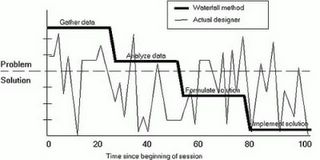Software development is not construction engineering, where most activities are repetitive and can be described in a detail by the procedures or automated. Kidd distinguished such kind of procedural work from the effort of knowledge worker, who's job is based on creativity and communication. Therefore software developer should be considered designer because, as Reeves pointed - code is the design. Moreover, in software all the effort is design, as stated Fowler.
Every design activity is more similar to research than the production. Design is hard to schedule, because of its very nature. Conklin and Weil have studied the designers behaviors and concluded that solving complex problems (design is such activity) is non-linear, chaotic and nearly impossible to plan - "the flow of their [designers'] thinking was full of upredictable leaps" (Conklin, Weil - "Wicked Problems: Naming the Pain in Organizations").

Figure 1: Actual pattern of problem-solving activity of one designer - the "seismograph" (source: Conklin, Weil - "Wicked...") [click to enlarge]
Also Fowler says that creative processes are not easily planned, and so predictability may well be an impossible target. This could be one of the reasons of the failure of applying the deterministic project management techniques to software projects.
It is important to understand the essential difference between traditional construction engineering and software development. Those who don't get it, won't see anything wrong with building a bridge an agile way :).
UPDATE (2005-07-18): Mishkin Berteig pointed me to the article supporting my argument. Really worth reading. Thanks Mishkin!
